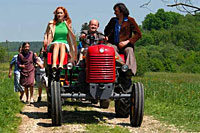Traktor, ljubav i rock’n’roll
Slovenia/Bosnia-Herzegovina, 2008, colour, 105 mins
Boasting not just the most self-parodically ‘Eastern European’ title of anything playing in the 2008 Sarajevo Film Festival but also arguably this entire blog, director/co-writer/star Branko Đurić’s film is an extremely broad comedy set entirely in a backward Slovenian peasant community in – apparently – the late 1960s. Not that the era is especially clear from anything onscreen, as they still plough their fields manually, rely on the local gypsy band for all things musical, and consult the local fortune-teller for advice on how to deal with everything from unwanted pregnancies to troublesome rivals.

She’s also the steely no-nonsense mother of Stefan Breza Popov (Đurić) a forty-year-old who’s apparently spent his entire adult life keeping her farm ticking over, despite harbouring implausible dreams of becoming a rock star. To this end, Breza has cultivated a Beatles mop-top (kept suitably wavy by a home-made combination of used corncobs and cow saliva) and George Harrison moustache, dresses in brown jacket, flared trousers and tartan winkle-pickers, and has purchased an electric guitar, with which he intends to wow the village and win the woman of his dreams – red-headed Silvija (Tania Ribič), a Swiss émigrée who works in the local restaurant. Despite his performance (rehearsed in the barn at great length to a recording of an unnamed “English rocker”, and using a chicken’s freshly plucked tailfeather as a plectrum) being hilariously terrible – the lyrics consisting almost entirely of “Be-bop-a-lula, she’s my baby, rock’n’roll!” – it is at least livelier than the usual gypsy offering and achieves the desired effect.
But Silvija has a complicated love life, sleeping on a regular basis with gypsy band member Gjirkoš, who despite refusing to leave his wife to marry her, nonetheless insists on a kind of droit de seigneur whenever he’s in the mood and she’s on her own (“Find a dummy, marry him, screw him when you have to and me when you want to” – though Gjirkoš doesn’t seem too bothered about that final clause as the film progresses). And Breza, too, is in something of a pickle, having pledged his mother’s cow Cvetka’s calf to the gypsies as a bribe to let him perform, the fact that Cvetka neither has a calf nor is pregnant being a minor obstacle. To complicate matters further, his mother has just taken on a new farmhand in the form of deaf-mute dwarf Duplin (Jaka Fon), who while well-meaning nonetheless has a habit of being in precisely the wrong place at the wrong time.

As that very brief cherry-pick of events from the film’s first third suggests, this is not a film for those who prize refined verbal and conceptual wit over pratfalls and slapstick. There are many times when Tractor, Love and Rock’n’Roll resembles a particularly silly Alexei Sayle sketch that’s been stretched out to feature length, and stereotypes run rampant throughout (“He beat your wife? But we gypsies only beat our own wives!”). That it somehow manages to run the distance is largely due to the likeable cast, especially leads Đurić and Ribič (the latter even managing to infuse the proceedings with several genuine dollops of pathos, whether bewailing her unsuccessful career and love life or agonising over the fact that her baby’s father isn’t her new husband), and a cheerful determination to wring laughs out of anything that moves, including chickens, pigs, goats, cows, and even an owl, which quizzically stares at Breza following an argument with Gjirkoš’s wife.
As is so often the case in films like this, the women generally come off best, with Silvija and her blonde colleague Nada running rings round the hapless Breza when he comes courting, though it’s Breza’s indomitable mother who rules the roost – even after he’s caught red-handed performing a little calf-rustling, she browbeats the gang that’s about to mete out a well-deserved punishment till they let him go. She can, as Basil Fawlty once observed of his own wife, kill a man at ten feet with one blow of her tongue – or at least close off any possibility for future discussion. “You gave my guitar to the gypsies!”, wails Breza after another bout of Machiavellian underhandedness on her part. “They have electricity now”, she replies, as though that justified everything.
Behind the camera, Đurić is efficient rather than inspired, though there’s a nifty trompe-l’œil shot at the start when we see what appears to be a large wardrobe being carried through a field of yellow rape – until the camera descends to ground level and it turns out to be a small wooden box being carried by Duplin on his head. This shot is echoed in the final pull-back from the farm, in which we see that Silvija’s plan to replace its traditional output by growing gladioli has been more than achieved. Narratively, it’s somewhat episodic, with many running gags (Duplin’s mysterious dried black fruit, Breza enlarging the farmhouse windows after his future father-in-law complains that they’re too small) fizzling out rather than building to a punchline, and Breza’s ultimate fate seems more than a little undeserved, though no-one seems that concerned by what would appear to be a blatant miscarriage of justice. After all, he probably deserved it merely for importing ‘rock’a’ro’ into the village in the first place.
- Director: Branko Đurić
- Screenplay: Branko Đurić, Feri Lainšček, Miroslav Mandič
- Photography: Sven Pepeonik
- Editor: Miran Miošić
- Music: Nedim Babović
- Producers: Janez Jauh, Ademir Kenović
- Production Companies: ATA Produkcija, Refresh Production, Gustav film, Jadran Film, RTV Slovenia
- Cast: Tanja Ribič, Branko Đurić, Jaka Fon, Semka Sokolović Bertok